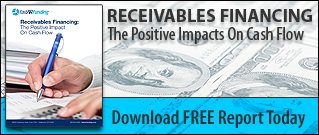 If there’s one thing I’ve learned during my tenure in the commercial finance industry, it is that there are all sorts of business management styles. What I mean is, there are small business owners who have a handle on their business’ financial side and there are others that don’t. Improving cash flow is on the radar for both types.
If there’s one thing I’ve learned during my tenure in the commercial finance industry, it is that there are all sorts of business management styles. What I mean is, there are small business owners who have a handle on their business’ financial side and there are others that don’t. Improving cash flow is on the radar for both types.
The business owners out there that have a handle on things usually know what their payroll is and when it needs to go out. They know what vendor invoices are coming due for payment. They keep a good tight rein on expenses. They have a solid balance sheet with good cash reserves in the event of an emergency. In other words, they are good at planning out their cash flow.
If you’re reading this thinking that you do not fall into this category of business owner, then you are probably continually looking for ways to improve cash flow.
There are many ways to improve your cash flow. You can look to an outside investor, but that comes at a price as they end up owning a piece of the company. Another option to consider is cash flow financing. There are all sorts of small business loans that can be obtained through banks. However, in these tough economic times, obtaining a bank loan is quite difficult.
Another avenue to consider is to establish a factoring program. Factoring is a form of short-term cash flow financing where you sell your company’s creditworthy receivables to a third party known as a factor, typically at an advance rate of around 80%. You get the remaining portion of the invoice less any fees once the customer pays the invoice.
Types Of Factoring
There are two main types of factoring. You have recourse and non-recourse. Factoring with recourse is where the borrower bears full financial responsibility should the invoice not be paid. Non-recourse means just the opposite and is quite costly.
Different Factoring Programs
As you might expect, there are different factoring programs or strategies to suit your cash flow needs. Keep in mind this doesn’t necessarily apply to every factoring company.
- You may want to consider factoring all of your company’s receivables. While there are associated fees to bear with this method, they are a small price to pay to ensure your company has adequate cash flow to operate.
- If you factor a receivable, then payments are remitted directly to the factoring company.
- If you’re looking to minimize factoring costs, then you may want to consider factoring receivables on an as-needed basis.
If you’re looking for ways to better plan out your cash flow, having a factoring line in place is another level of security to ensure that your cash flow needs are always met.
Fast A/R Funding specializes in helping small businesses bridge the cash flow gap with factoring. Download our informative “Factoring 101” guide, or call 888.833.2286 to speak with one of our small business finance consultants.










